Given a choice, I would avoid conflict like the plague, but I don’t live in a plastic bubble. My day is full of personal interactions with family, friends, co-workers and strangers (including the telemarketer predictably calling at dinnertime). As a result, I find that I constantly need to exercise and hone my “handling conflict” skills.
Thankfully, I’m blessed with the most inspiring teachers in the world: the infants and toddlers in my classes. If I were half as willing and able to face conflicts directly and work through them as these little ones do, I’d be fine.
How do we learn to resolve conflicts? Our biggest influences in both our attitude and response are our parents (no surprise there). As our primary role models, we learned by observing them deal with their own conflicts, and most profoundly by their interactions with us. These core lessons, instilled early on, become part of our psyche and can overrule everything we absorb intellectually later in life.
We also develop our conflict skills through early interactions with siblings and peers. Through trial and error we discover how to achieve the desired results, which might be expressing our feelings or defining personal boundaries without severing our connection to the people involved (unless they’re telemarketers).
Conflict resolution is an art rather than a science, because each situation presents so many unique variables. Each individual’s temperament, perceptions, baggage, etc. all come into play. Should we hash it out? Insist? Give in? Or just walk away? There’s no one-size-fits-all approach.
So we can all use as much practice as we can get, especially young children. Beyond exposing our children to everyday social situations — play dates and trips to the park — how can we help children learn to manage and resolve conflict?
In short, by allowing them to experience it with our support. Providing this support means learning when and how to intervene. Here are some of my intervention do’s and don’ts:
1. Don’t resolve conflicts for them
It’s a big challenge to let go of our adult wish to tie a neat bow around our children’s disagreements and avoid their emotional outbursts. But our interventions can prevent children from learning much of anything other than that they are dependent on us to fix these situations, incapable of handling conflicts themselves.
Resolving it for them includes demanding that toddlers share or take turns, as well as offering ideas and suggestions like, “How about you both hold onto the pail and carry it together? There you go!”
The challenge for parents is to allow children to safely engage in conflict and resolve it their way, rather than letting our discomfort or impatience get the better of us. The more we say and do for our children in these situations, the less they will learn to handle themselves. Trust and patience must precede learning.
2. Don’t neglect to protect
Some misinterpret “respectful discipline” as simply telling children not to hit, bite, etc., rather than physically intervening. Children need both. They need us to be ready to prevent these harmful behaviors if possible, blocking or holding children’s hands and calmly shadowing children who have demonstrated these behaviors in the past (or seem in an out-of-sorts mood that day).
3. Don’t shame or lecture by pointing out the obvious
One of our goals should be to help children build confidence to deal with conflicts, but much of the expert advice commonly given strips confidence away. A friend shared this exchange she’d had with her toddler’s prospective teacher:
When I asked what the teacher does when there’s conflict, she said something along these lines of, “I show the child – look at John’s face, he is hurt, do you see how he looks? Do you see how your actions hurt John?”
As I told my friend, this type of response is one of my pet peeves. It’s heavy-handed, shaming and underestimates our children’s awareness. Kids are even more sensitive than we are, and beginning at birth it is next to impossible for them not to register the feelings of those around them. Hitting or pushing has much less to do with “John”, much more to do with what’s going on inside the “perpetrator”. Generally, these are momentary impulses beyond a young child’s control, and our job is to help toddlers with these impulses, not rub their noses in the consequences of their actions.
4. Don’t speak in exclamation points, use an angry tone or expression
Again, this creates shame, erodes confidence and fuels the undesirable behavior by giving it negative attention.
5. Don’t take sides
Taking sides creates “bad guys” and “helpless victims”.
Which brings me to the do’s…
1. Make “remain neutral” your mantra
2. Acknowledge both sides (sportscasting)
3. Protect children by preventing hitting, pushing or repetitive toy taking calmly and confidently, and shadow a child who seems to be having a difficult day.
If children seem to be caught in a pattern of hitting, biting, pushing (or other limit-pushing behavior), they need our help and protection, not our scolding. They might be:
Tired
Hungry
Seeking the firm limits they are not getting at home
Angry, frustrated, overwhelmed
Releasing stress
Feeling over-excited, overstimulated, out of control
If we don’t catch the behavior in time to prevent it, firmly and matter-of-factly remind the child, “You want that toy, but I won’t let you hit” or “I don’t want you to hit.” Leave it at that.
4. Let infants and toddlers take toys, because this is on their short list of “playing together” possibilities. Only intervene to protect an older toddler’s more elaborate projects or when a child seems stuck in a pattern of toy taking. (For more on this, please read What to Do About A Toddler Toy Taker.)
5. Keep an open mind – This means allowing children to do it their way, which will be different from our way most of the time. Trust is our biggest challenge.
6. Wait rather than putting a time limit on conflict, even if it seems intense. If no one’s getting hurt, it is healthy for children to release these feelings.
Kate from Peaceful Parents, Confident Kids shared this brilliant example of patience and trust paying off… (Lucy, 2.5, and Penny, 1.5, are sisters)
I put your advice into action on a car trip this afternoon. Penny was playing with a toy turtle that Lucy had happened to bring on the trip in the first place. Lucy noticed and shouted, “that’s my turtle, give it to me!” Penny looked at her momentarily and then continued to play with it.
I said to Lucy, ‘You really want that turtle, Lucy.” And then to Penny: “You’re still playing with the turtle”, and then silence. I wanted them to process.
After about 20 secs, Lucy, then in a much calmer voice said, “Please, Penny, can I have the turtle”. Penny still continued to play with the turtle. So I stated: “You’re still playing with the turtle, Penny”.
Silence again for about 30 secs, then Penny began mouthing the turtle and Lucy started getting a little agitated again and with a raised voice said, “Don’t eat the turtle, Penny!”
I then said, “You don’t want Penny to eat the turtle, Lucy.”
She said (much calmer), “No!” and then added a little later, “Just pretend.”
Then silence for another 30 secs or so, and then an ecstatic voice: “Penny, gave me the turtle!”
I looked back, and sure enough Lucy had the turtle and all was peaceful!
***
For further reading:
Toddler Bites by Lisa Sunbury, Regarding Baby
5 Reasons to Love Conflict by Emily Plank, Abundant Life Children
Sibling Conflicts: Guest Post Solutions From Lisa Sunbury, The Twin Coach
Could NOT Forcing a Toddler to Share Help With Sharing Conflicts? by Kate Russell, Peaceful Parents, Confident Kids
Siblings Without Rivalry by Faber and Mazlish
5 Benefits of Sportscasting Your Child’s Struggles, The S Word – Toddlers Learning To Share and The Baby Social Scene – 5 Hints for Creating Safe and Joyful Playgroups on this blog
For video demonstrations:
These Toddlers Are NOT Sharing
Don’t Fix These Toddler Struggles
Baby Tug Of War, We’re Just Playing

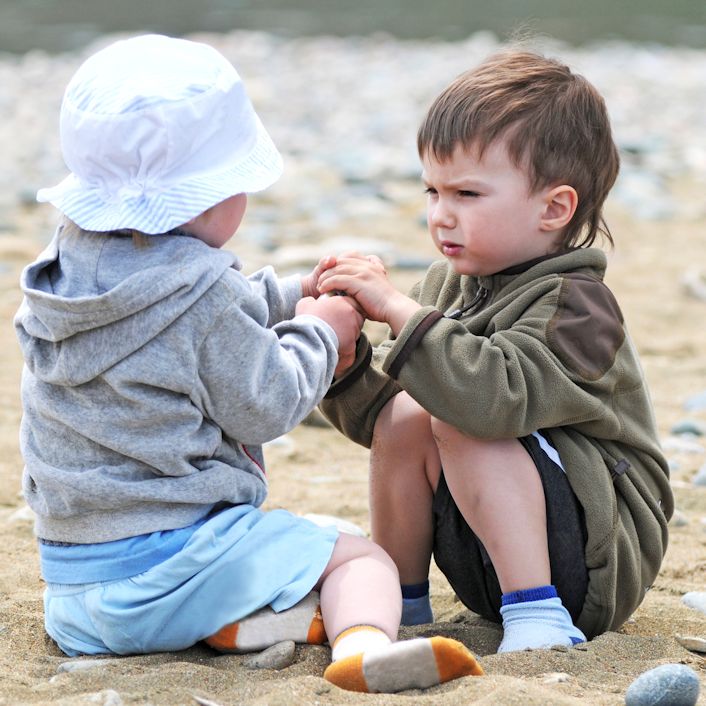
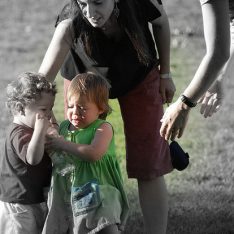

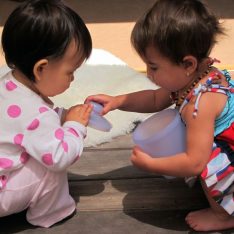

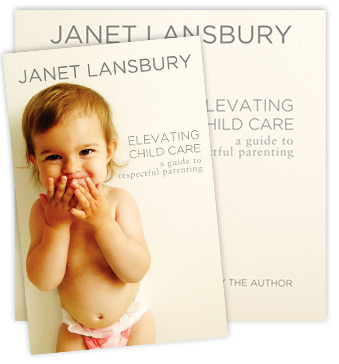

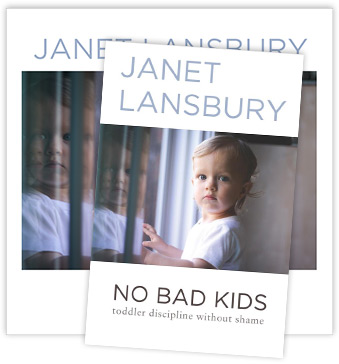
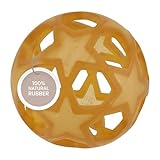
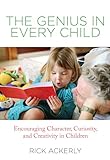
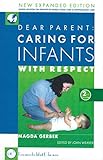
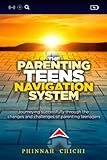
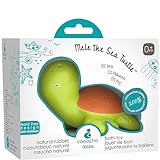
Yes! What a great post. As mom of a single child, it is sometimes so challenging to find other parents willing to practice this! I do have an interesting anecdote to share on this topic. My 27 months old was in a play context with other toddlers, with a teacher expertly practicing what you describe here. One child (I’ll call him A) seemed to be in toy-taking and limit-pushing mode and kept grabbing from other kids, and one toy in particular my son P was playing with. The teacher moderated calmly, preventing A from grabbing too agressively, and sportscasted. Maybe one hour later, a similar situation arose again between the two, but the teacher was busy elsewhere. A tried to grab a toy from P again, who hung on to it tight and said VERY firmly “NO!” When A insisted, my son said very authoritatively (to my surprise, I was observing the interaction from the other side of the room) “Sit!” And (to my greater surprise), A responded : “Oh, you want me to sit?” “Yeah.” “OK”. And that was the end of that. The next class a week later, A never tried to grab from my son again and they even played together quite nicely, A somewhat following my son’s lead on various play ideas. Letting them resolve this together, with some support, helped my son learn how to set his own boundary, and helped A understand clearly that boundary and freed him from pushing the limit, it seemed. It almost felt like a “finally I am told clearly what is expected of me”. It was quite fascinating… So much conflict learning and growth in that small interaction.
Wow, what an amazing story, Helene. This just proves how important it is not to judge the way the children solve things. I mean, “Sit”?! That’s hilarious and yet it was so effective. 🙂 Children bring us the most wonderful surprises if we can trust and let them. Thanks for sharing!
Do you disagree with Teacher Tom’s post on hitting then? http://teachertomsblog.blogspot.com/2011/09/hitting.html It’s possibly one of my favorite things on the Internet. It doesn’t really seem like shaming to me, but it’s very similar to the situation you’re describing under “shaming.”
Thanks for asking, Meagan, I just re-read that post…and I actually don’t agree with: “…try to keep the goal of teaching empathy in mind.” Children learn empathy the same way they learn LOVE, TRUST, LOYALTY, RESPECT, KINDNESS, GENEROSITY, FORGIVENESS, etc., and even letters, colors and numbers. They experience examples of these things in their world, hopefully modeled and valued by those most important to them — their parents. And in each child’s perfect time, they internalize these values, character traits, bits of knowledge, etc. I know that Tom believes in the power of modeling and natural learning in most of these other areas, so it’s actually curious to me that he thinks we must push the empathy lessons a bit more… I’ll have to ask Tom next time we have breakfast together!
Hello Janet! Wonderful post,I was especially affected by your opening paragraph on how we as parents have so much impact on how our children learn to deal with conflict. Could you provide some examples or scripts on how to better handle number 3 in the “don’ts?” I’m not sure where I came across the idea of pointing out to my child the emotions of the “victim” similar to the example you described, but I’m fairly certain it was from a respectful parenting forum similar to yours. I have done this with my son when he has hurt someone physically, and I would like a better way to address it. I generally do not do this in the presence of the other child. I will remove my son from the situation, try to calmly reflect on what happened, and then point out the other child’s emotion. For example, last week he became frustrated and threw down a toy, which bounced and hit another child, resulting in the child crying and having a scratch on his nose. I removed my son from the room and sportscasted or maybe more like instant replayed “you threw the toy and it hit the boy and hurt his face. He is crying.” I did not force apology but I myself checked on the boy and apologized to the boy’s parents (who were very gracious) in my son’s presence. I was under the impression that gently calling attention to the emotions of others in response to my son’s actions was helpful in modeling empathy, but after reading the above am no longer clear. I try to avoid shaming at all costs, so if I am inadvertently doing that please set me on a better path. My son is almost 3.
Thanks, Nicole! Regarding the situation you described, I would not remove your son unless he suddenly went off and started throwing, hitting, losing control. I would go close to him, while allowing him to take in the situation the way children naturally do — they are acutely aware. Young children literally cannot filter out stimuli the way older humans can.
So, I would move in close to prevent any other unsafe behavior that might occur. Then I would probably reflect what I see the other boy experiencing, not jumping to conclusions, taking my cues completely from him and stating what I know: “Billy threw the toy, it bounced and hit you. I saw that.” If the boy was upset: “That hurt you, didn’t it? You are very upset. Ouch, that hurts.”
I would stay totally neutral, not give my son angry looks, etc. Meanwhile, he is taking in everything. He sees what happened to his friend and your caring response. The moment the toy hit his friend he realized he had done something wrong! So he doesn’t need the obvious drummed into him. Now, instead, he has the emotional space to feel empathy, rather than feeling overwhelmed with shame, guilt and badness. This works.
I think one of the reasons RIE instructors understand this and preschool teachers might not, is that we are able to observe and work with children from the time they are 3-month-old infants. We see infants taking in their friend’s feelings. We witness children observing and even empathizing with each other as infants. We recognize that shaming, blaming responses get in the way.
If you see your child take a toy from another child that you don’t know in a non-aggressive way and the other child does not respond, what should you do then?
If a child has her toy taken away and doesn’t have any response, I don’t think there’s anything for the adults to do. We have 16 month old twins, and they’re sharing champs most of the time because they don’t have a choice. Often, A will take I’s toy, and I expect I to freak out, but 90% of the time, she just goes to get another toy and it doesn’t bother her at all. I’ve learned to remain non-responsive unless one of them does get upset, then I sportscast and the conflict is usually over quickly. They never get physical with each other, so we haven’t had to cross that bridge yet.
I like your answer, Reannon. Adults are inclined to see problems where children see none.
Nothing. Just observe the situation closely for the parent’s attitude. Crabby parents? Shadow your chid and broadcast. Parents no more concerned than the child, leave it alone.
A friend of mine posted this article on Facebook. While I appreciate and learn a lot from most of the articles she posts, I STRONGLY disagree with this one. I am taking it very personally and feel a need to speak out against this. In my opinion, this is just an excuse for parents who do not want to discipline their child. I am specially referring to item #3 in the article. My daughter “A” was in a Waldorf Preschool who practiced this philosophy and was continuously beaten up by this one child. Every time he walked in the door, he would head straight for “A” and pull her hair, smack her in the face, or push her. (And no, “A” never did anything to him…ever.) He was just a bully. The teacher use the exact words quoted in #3. Nothing ever changed. He continued this behavior without any remorse. Come to find out, he did this with another child before “A” arrived as well. He obviously wasn’t learning anything by using this method. When you are teaching a child his shapes, do you let them figure it out on their own? No, you show a shape and you tell him. You say, “This is a circle.” If he says, “It’s a square.” Do you ignore it and let him figure it out on his own with no adult intervention? No, you tell him it’s a circle and you show him what a square is. It’s the same thing with discipline. You tell him what the correct behavior is. You show/ model what he should do.
Heather – you must have misunderstood this post, because if your child was harmed, the school could not possibly have followed the approach I’m recommending. I’m also wondering what alternative you are suggesting…not sure how “this is a circle” relates to physical behavior.
I’ve heard what Heather describes as a frequent criticism of the Waldorf approach, but this should not be confused with the method that Janet discusses. From the anecdotes related to me, Waldorf instructors take a completely hands off approach to the point of not intervening at all in situations of physical harm or bullying, which is extremely troubling and worrisome, and as a parent, I would be infuriated as well. Again, however, that is not the method Janet is describing.
Excellent advice, as always. In order to pull this off though it helps if you decide not to be averse to conflict, at all. Make the decision to LOVE conflict. Conflict aversion is not a virtue it is a weakness, because any two human beings are always in incipient conflict. The fact that 95 percent of your conflicts don’t feel like conflicts is that you are so good at it.
WIth this attitude, you can see each new interaction that feels like a conflict as an opportunity to practice the skills you so nicely outline. Here’s a story about how I changed a conflictual relationship with my teenage son into fun: http://geniusinchildren.org/2011/12/21/peace-joy-love-and-conflict/
Rick, thank you, I totally agree about the value of a positive approach to conflict. Magda Gerber used to say, “If we can learn to struggle, we can learn to live.”
Thank you for this article. I think the biggest challenge in my life at this juncture is learning to accept that conflict can be a positive, even healing experience. As a child my association with conflict was physical and emotional punishment so it has been a great challenge to take a different approach with my 28 month old daughter who is strong willed and very persistent about what she wants and/or does not want. It is a challenging trait, but it is one that I admire. Our biggest challenge right now is sleep, namely putting her down for naps and bed time. Usually by these times she is definitely tired and expresses her distaste for laying down verbally by yelling and by physically pushing me away. I thought I was being gentle in my response but after reading this article I think there might be a degree of shaming to my approach which I definitely did not intend. The yelling and screaming I can handle with calmness usually, but the pushing physically hurts me and I have, along with telling her “I won’t let you push me” and blocking her hands, told her “You are still pushing my body and it is hurting me, so I am going to leave the room now and take some space. I will come back in a few minutes.” I try to speak to her with calmness and gentleness but I perhaps a response like that might instill some degree of guilt and/or shame. What do you think?
Heather, I don’t think being honest about your personal boundaries can ever cause shame. I love this: “I won’t let you push me” and blocking her hands, told her “You are still pushing my body and it is hurting me, so I am going to leave the room now and take some space.”
You are taking care of yourself and that’s wonderful modeling.
Remember also that it is common for children to need to release strong feelings before they can let go and sleep. Kate from “Peaceful Parents, Confident Kids” recently posted about that: http://peacefulparentsconfidentkids.wordpress.com/2013/09/05/coping-with-a-toddlers-emotional-outbursts/
Janet–thanks for this post. I have been trying to use these strategies, and have a question. I feel like my daughter and her friend S have a particularly hard time with sharing (both just over 2y). I have tried sportscasting with them and staying close–but more often than not, things devolve into both girls clutching the desired item, screaming, and S prying my daughter’s fingers off. Should I be doing something different to avoid this situation? Once it has devolved to that point, what’s my best approach (prying isn’t hitting, but still…)?
Thanks, Stacy! I would let the struggle continue, but treat the prying as hitting or pushing: “I see how much you want to move her hand, but I won’t let you touch her fingers” (placing your hand in the way). “You both want the doll. It’s so hard when you both want the same toy, right? Yes, I see you are getting very frustrated”, etc, etc., etc. Just let them go as long as they need to and it will blow over… and maybe letting this continue to the end will help get this rivalry out of their system! It might help you to perceive these situations as a kind of game, like tug-of-war or arm wrestling. I can guarantee that this is more fun than it appears to be.
Hold everything! A stern voice creates shame?
At your recommendation, I’ve been reading, “How to Talk So Kids Will Listen and Listen So Kids Will Talk,” and it suggested a stern voice, without attacking the child’s character.
I used it when I needed my 14 mth old to sit at the table at a restaurant tonight and again when she dumped water out of the tub (again!)
Janet, help!
Katherine, I wish I could agree with every detail of every book I recommend, but no, I don’t think children need “stern”, eyebrows furrowed, etc. They DO need firm, which means an assured response, ending with a period rather than a question mark. Stern is on the verge of angry, isn’t it?
Okay, I Googled and here are the synonyms for “stern”: serious, unsmiling, frowning, severe, forbidding, grim, unfriendly, austere, dour, stony, flinty, steely, unrelenting, unforgiving, unbending, unsympathetic, disapproving
Now here’s “firm” (much better!): resolute, determined, decided, resolved, steadfast
Oh, goodness. I’m sorry to my little one 🙁 I’ll retire the stern voice . It was short lived, at least.
She’ll forgive you!
It would be considered lecturing when she drops a full cup of water and we comment that, “when you drop your water, it spills and you no longer have water to drink,” yes? What’s a better response…none at all?
Great questions, Kat. It might be helpful to consider the reason you want to explain to her about the water.
1. Are you hoping that by helping her to understand she’ll stop doing it? She might or might not, but if this doesn’t work and she drops water again anyway, will you be offended? This can be a set-up for parent frustration, yelling, etc. And this mini-lecture has made the event more interesting than it might be.
2. Do you think she doesn’t realize that you don’t want her to drop water? I would doubt that very much.
3. Are you trying to avoid being direct and simply saying, “I don’t want you to spill the water”? I think this is the most helpful response for toddlers. They need lots of clarity and directness and then they often need us to be double-clear by following through: “I see you starting to drop the water again. Thank you for letting me know you need help stopping. I’ll hold the cup for you while you drink” Or, “It seems you’re done drinking the water, because you are trying to drop the water. Thank you for letting me know. I’ll put it away.”
I have a very spirited 4 year old. He is quite expressive and articulate except when someone tries to take his toys (or the toys he is currently playing with)! I do not force share yet when he grabs and screams “hey thats mine” I find myself jumping in very quickly to the rescue. Usually I say something like “Jack dont grab,use your kind words” and then give him the proper way to ask for his toy back such as “please give me that toy back i am still playing with it” This scenario has happened over 100 times yet still he has yet to use his “kind words” unless prompted. He seems to become so anxious/agitated that he cannot. He is also the type of child to hide his toys when we are out either in my bag or try to make me hold them all so others cannot take them. He tells me to “protect” them 🙂 He’s done this since he was 2 and although I appreciate his attempt to prevent these situations from occurring, I wonder why he is so anxious about others using his things. I hear from my mother in law that my husband was exactly like this (he used to lock his stuff in a safe!) Could this be genetic? How can I help him to see that its OK to share his stuff sometimes and that he will get it back (he says his fear is that they will take it away). Also he shares better when other children are in our home then in public places. Any advice would be great.
Jaime, I’m not Janet but if I my…I recommend this book. Great, actionable advice. http://www.amazon.com/Share-Renegade-Raising-Competent-Compassionate/dp/1585429368/ref=sr_1_1?ie=UTF8&qid=1378577727&sr=8-1&keywords=it%27s+ok+not+to+share
Janet, this article is toddler gold! I think it’s your best on this topic yet. Thanks so much!
What a great article! I need to work on not shaming (mainly just by the voice I use and facial expressions), especially when my daughter hurts her 4 month old sister.
We had a hard situation the other day that I was unsure of how to deal with. I was watching my friend’s children and my 3 yo daughter was being really rude to the 2 yo girl, although not physically hurting her. She screamed and yelled anytime the 2 yo wanted to use one of her toys, she didn’t want her to use any of the collage supplies, she didn’t want her to have any snacks. By the end of the playdate, I was so frustrated. I knew I shouldn’t try to make her share or be nice, but I felt bad for our guest. In the end, I insisted that she let the little girl play with a few of her toys, because otherwise she wouldn’t have had anything to do. But at the same time, this felt like I was forcing her to share.
Also, I always feel like I should apologize when my daughter hurts another child or steals a toy, especially since I’m not doing the “norm” and making her apologize. Do you think this is ok? What effect does it have on my daughter to hear me apologizing for something I didn’t do?
My suggestion is before the next visit, I would explain to your daughter that the 2 yo will want to play with her toys, that that’s part of her being our guest, and ask your daughter if there are any toys that she won’t want the other child to play with. If so, you can remove those to a safe place until after the visit. Have your daughter designate the toys that are ok to for others to play with.
Dear Janet, I cant avoid foreseeing a parenting book while reading your latest posts. You are getting more and more precise, more and more to the point, and I am so sure many many families are being benefited by your words. I love reading you and would definitely love to read YOUR BOOK!! Is it on the way or am I just imagining a crazy (and wonderful) dream? Love you, as always, Fernanda
I am really struggling with our neighbours. It is wonderful that there r other kids in our street and sophie loves playing with them and riding bikes in our very quiet street. But the other mothers dont share my parenting styleand make their children share so Sophie puts all her bikes away because she doesn’t want the other kids to ride them but she expects ( and usually gets to) ride all their bikes.
I’m not sure what I should be doing in this situation – I would at first think to avoid going out side altogether but it’s just not realistic or fun but the other day I found myself saying to Sophie that if she wanted to go out and ride Jacobs bike then she has to share her bike. This didn’t feel right either but I felt cornered – the only other option was to go inside which we would have all been sad about.
I also bought a seesaw which I though would help Sophie – she can not do it by herself- it is only fun when she involves/shares with her friends.
…;… as I write this I realise its all comes back to the same issue I have been struggling with for awhile- Sophie’s possessiveness .
But for today I guess the question is what is the best thing for me to to when all the other parents make their kids share ( which I don’t), I feel Sophie is learning the wrong message by being able to use everyone else’s stuff and not share a single thing if her own……
A couple of links to Janet’s other articles that speak to your questions:
https://www.janetlansbury.com/2011/03/dealing-with-parenting-differences-among-friends-family-and-kind-strangers/
https://www.janetlansbury.com/2014/06/share-wait-your-turn-dont-touch-playdate-rules-that-limit-learning-and-what-to-try-instead/
hi janet
just saw this article after a particularly upsetting incident today. the teacher’s method in number three really describes a scene i saw at the second day of my 3 year old’s preschool. i wondered what you would say after a hitting biting or pushing incident has occurred –instead of the shaming scenario described? in the past i have said “i am sorry i did not keep you both safe” or “i cannot let you pull john’s hair so i am going to help you stop.” and then when the action stops i feel like i need to say SOMETHING MORE. what is the next step when you could not prevent aggression and you have acknowledged it and intervened and both children are being comforted? i end up kind of sitting with my son and the other kid and not knowing how to proceed. any advice appreciated. thank you!
Hi Janet,
I sent a similar comment to an earlier post, but I’m not sure how you’re alerted to comments and I wanted to be sure that my communication reached you. I am a mom of b/g twins and love the RIE approach. Our son is a toy snatcher. Initially, my gut instinct was to say to our daughter when he took a toy she was playing with “What are you going to do about that?” My husband, though, was worried that this unfair to our daughter and didn’t want our son to think that his behavior is “OK”. So, he would take the toy back from our son and give it to our daughter. This led to our daughter crying every time a toy is taken and looking at us to resolve it. (Now that he’s read this post, he understands better the reasons for less intervention).
My question is how to “undo” what we’ve done. Our son is still snatching things from our daughter. He also takes stuff from me, but I don’t let him. For example, if daughter is on my lap reading a book, son will come over, also climb in my lap (which is fine) but then he’ll grab the book. My response is to hold onto it tightly and say that I’m reading it now and he can have it when I’m done and/or to give him a different book to look at while I’m reading.
Any ideas or suggestions about responding to this…or not responding to this? At present, for the past week or two, we’ve been trying to practice sportscasting. No change in behavior yet.
Thanks in advance.
What to do when kids’ speech is abusive? My kids are in a vicious cycle. My 5-year-old pesters my 8 and 10-year-old because he wants their attention. As a result, the older two gang up on him and never physically hurt him, but the words they say are extremely hurtful. I feel like I must intervene – though I’ll admit my interventions don’t seem to help.
Janet, I don’t seem to see any comments or part of your article that addresses children of different ages.
I tend two sisters, 2 and 4 years of age. Miss Two will happily find things to play with. Miss Four (who I would describe as domineering and and also very defiant) almost always is drawn to her sister’s play and will take over and begin directing everything. Sometimes Little Sister doesn’t mind, but sometimes she does and the situation winds up with a lot of screaming. Often Big Sister is very annoying. They sometimes get physically mean with each other. Big Sister said to me yesterday, after she’d snatched Little Sister’s toy, “But this is sharing!”
I am trying to explain to Big Sister that sharing involves choice. I also enforce it. I can’t think of any other way that would be right at all. I just can’t see how the method you described would fit this situation. Is it the age difference? The fact that they’re sisters?
How would you handle this, wording and all please.
My son is 23 months. A I would say 3 year old boy visited the gym care center I work at. He in my opinion was out of control. Some scenarios that concerned me that I want to know how you would handle.
The boy seen my son wanted the kitchen food. Every thing he wanted the boy would grab. My son was very upset. I was comforting him on the couch and the boy deliberately was showing him close to his face that he had it all in his hands. My son cried more and more.
Once down my son got a tea cup. The boy began chasing him saying he was going to get the cup from my son with my son crying and screaming no. Then the boy wanted him to chase him to get the toy back.
Later he seen my son wanted this worm toy. He deliberately took it and my son began crying. Once again comforting with the kid wanting to show him that he had it.
Then my son got the worm when he was done. I finally had enough and said it was not going to be taken. The boy realized he could not take and he began ramming into the worm with a bus as my son cried and screamed no over and over. He would walk away from the boy and the boy would follow and repeat. I handled it saying he is asking you to stop. He is saying no. If I see the bus slammed into the toy again I am going to have to put the toy away. I do not want to because I know he is having fun with it but my son is asking you to stop.
I do not know how I was supposed to word this. What was going on? If he comes back I need desperate help wording this.
I have to disagree with your approach regarding biting and hitting. This same approach has been used and now a pattern of behaviour is left. Other people bring their children to us so we keep them safe. As a result of your approach this now developed pattern of hitting a d biting has escalated into this violent behavioural pattern. Completely unacceptable. Children absolutely have to have consequences for their behaviour.
Also, just wondering , in your article you say ‘do you want this toy’? But I certainly hope you didn’t give it to them after they hit someone. You were not clear on that. We can still be kind and gentle but they need to learn there are consequences for god or bad behaviour…just like there are good or bad consequences for behaviour. I feel we as adults don’t do any favours by limiting lessons that need to be learned.
You are welcome to disagree, Jabby. No, I would not give a child a toy. I would, however, try to help the child express himself or herself in an appropriate manner. Why do you believe this child bites or hits? That is what I strongly recommend considering if you are sincerely wishing to help this child.
Hi Janet,
In your article, What To Do About A Toddler Toy Taker’ you say, “This seemingly passive reaction from a child often concerns parents as much as a child’s aggression does. Is my child too timid? Will he always shy away from conflict, let others take advantage and walk all over him?” Do you have anything more to share on this? My 27 month old is this child that you describe and after reading time and time again that it’s developmentally normal for toddlers to test boundaries and learn through snatching, biting, hitting, etc, I wonder if my daughter is not “normal”, not meeting developmental milestones or if she hasn’t been socialised enough. She’s starting to say, “I’m using this” at home with us (mum and dad), but when we’re out she’ll say it and look at me as opposed to the child who’s trying to take it from her. Generally though, even when other kids are possessive with HER toys at our house, she won’t seem bothered. I’m hoping she’s just very laid back and this will get her far in the long run!
Hi Janet! I am finding myself getting lost in your website – so many wonderful suggestions and insights, thank you. I will be running a Montessori-inspired playgroup for twos and threes and their parents, and I know that this topic will come up. I’m in the process of writing a handout to give parents with some basic suggestions for language, observation, etc. Here is my question: If one parent is noticing and trying to support two children in a conflict, and the other child starts to get physical, what should that parent do? Obviously, I would not put my hands on a child I did not know – but what if (s)he was throwing a truck at my son, for example? How do I protect my child (physically as well as his right to play somewhere)? Thank you so much!
I see this is an older thread, but can’t seem to find the answer to my question regarding setting boundaries when it revolves around other people’s children. I brought my 10 month old daughter to an indoor playground where two 4 or 5 year old boys pushed her to the ground and aggressively ripped the toys out of her hands. I was standing nearby, and since their mothers were watching from a few feet away and didn’t intervene, I was a bit shell shocked and unsure as to how to handle the situation respectfully while still intervening with unwanted physical behavior. I quickly blocked my hand over my daughter and asked the boys to be careful around the baby. The two boys continued to push and aggressively take toys from several babies and younger toddlers in the play area, until finally one mom had enough and told the boys to back off her son since they were hurting him. It’s one thing to let kids resolve their own disputes, but these boys weren’t learning anything other than the fact that they were kings of the playground. My question is, what do I say in that situation – especially when their own mothers are sitting right there? While I want my daughter to learn to handle her own disputes, I’m not going to send a signal to her that it’s okay to stay silent when someone gets physical with her. Whether or not she was upset by the interaction (she seemed startled and annoyed), saying nothing, especially when she can’t yet speak up for herself to these boys, feels akin to condoning their behavior. What is an appropriate way to set boundaries when other people’s children get physical with yours? Thank you!
Hi Janet,
I was wondering about a toddler in a group setting who is continually getting their toys “taken” by others. I see it as an opportunity to sportscast feelings around this so that everyone can learn about their actions but I worry about the child who is not assertive.
Hi, do you think that it is too much intervening to ask a toddler to use his or her words to ask the other child for what he/she wants or needs? I work in a toddler montessori environment and I would do this with children who are able to speak. With younger children I would sportscast and sometimes do the asking on their behalf. However if the other child is not willing (i.e. to give a toy or his space or agree to working together with another child) I would respect their preference, assuming there was no grabbing (of toys) involved.
I have twin boys who are nearly 3 and A is always bullying B (who is more fragile in general and easy to upset). A will look for opportunities to block his movement, get to a toy/lap/toilet before him, and touch B’s food or chair in a way he knows is upsetting. B is constantly tormented like this so it is hard to blame him when he hits. I try to stay out of it as much as possible but I am so frustrated with A that his only way of “playing” seems to be harassing B. Is A going to be a sociopath, or am I missing his efforts at communication?
Hello. Thank you for the great post. I don t know if l should be concerned for my little girl who is 39 month old or that her reactions would get better by time. She is not the hitting or toy taking one. She is the emotional one that bursts out for evetything, cries so loud and get so upset that it is limiting my time out in park or in general time out with other mothers for play dates. She gets so upset when she can t get her way and comes to me for help and if l ignore her which l tried her loud cries would be long enough to bother everyone around us. Its been like this since she was around 2 and at first l thought it was just a phase but its not ending and l really wonder if its a behaviour and an emotional problem. She is a very sweet and kind kid who likes to share and is friendly. Yesterday there was one much smaller child almost a 1.5 year old baby chasing her in the park and she ran to me crying. Seems like she can t defend herself at all and tears come immeditely then comes an emotional outburst. What should and can l do, l m in desperate help. Thank you.
Hi,
I am a bit perplexed about Don’t No 3 :
Don’t state the obvious.
I am not sure it’s obvious to an overwhelmed child that her actions upset John. She is probably enclosed in her fury. Isn’t it part of our teaching him to control his impulses to attract attention on the consequences? It can be that we say “Look what John, he s sad” but also that we just check if John is/feels ok, can’t it? After all we model caring about others, don’t we?
Thanks